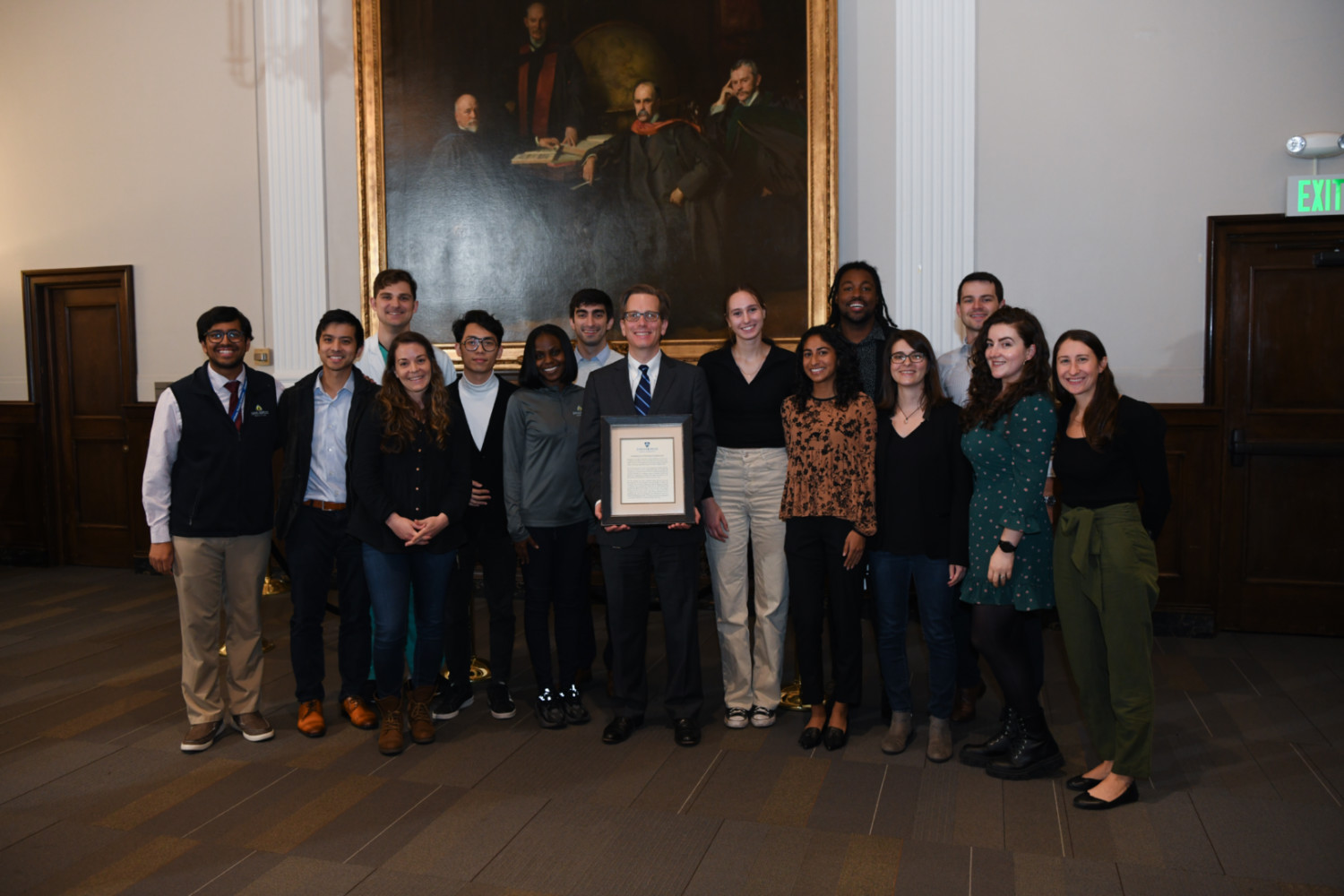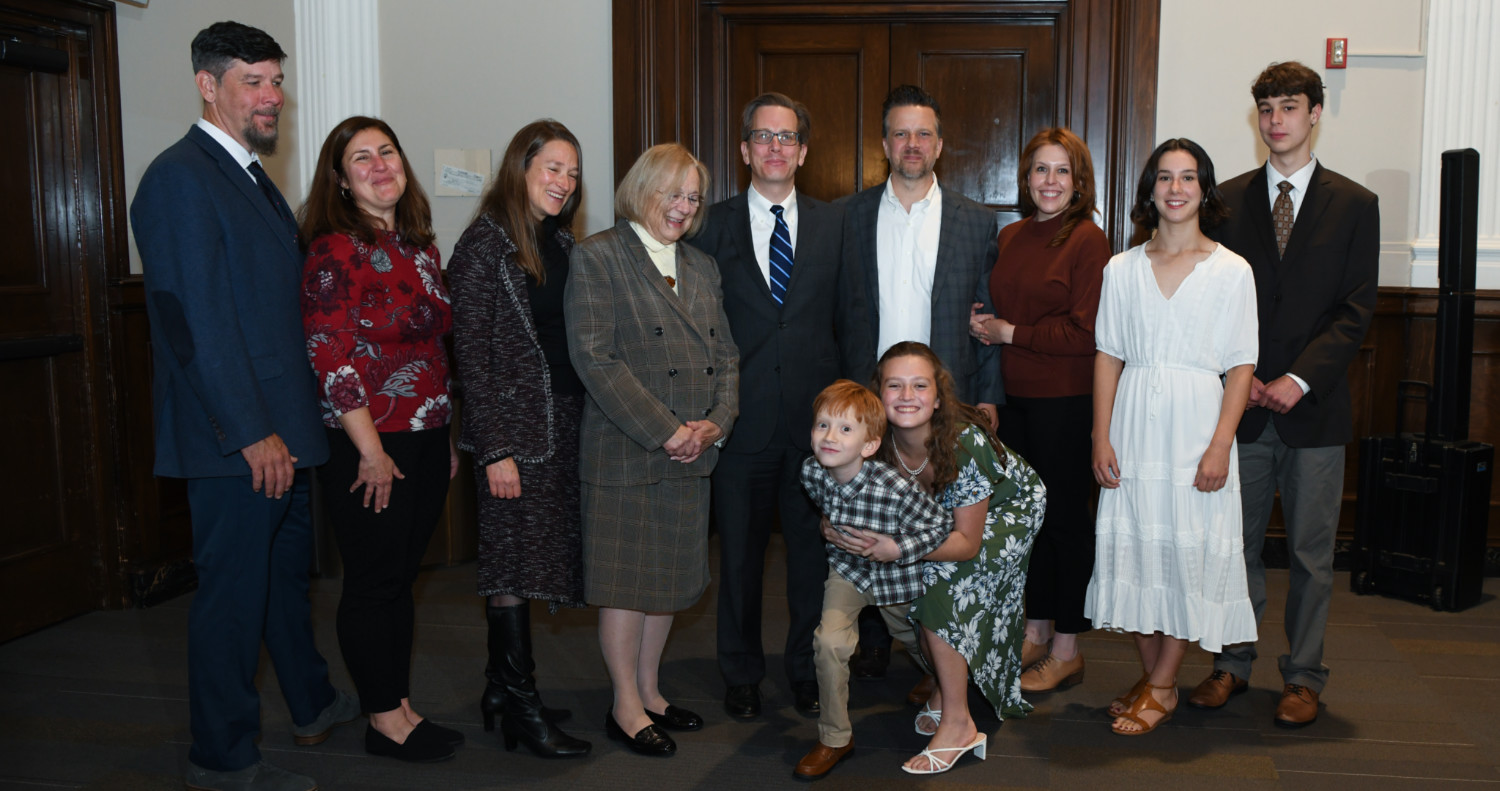Understanding a tiny individual cell can answer big questions, like how to cure diseases or solve scientific mysteries. Andrew Ewald, Ph.D., director of the Department of Cell Biology, has spent most of his career studying how breast cancer cells function, spread and survive.
Ewald and his team discovered the molecular program driving the spread, or metastasis, of luminal breast cancer. They found that cancer cells travel in groups as they spread, and the cells rely on these adhesive connections to survive as they metastasize.
They also demonstrated that the contractile cell layer surrounding breast milk ducts grabs stray cancer cells to prevent them from spreading, that cancer cells take over blood vessels to spread through the body and that cancer cells can alter the function of immune cells to help cancer cells spread instead of killing them. The team recently identified a special class of breast cancer cells that lead the first step of cancer spread in triple negative breast cancer.
Ewald was appointed department director in March of last year, and recently was named the Virginia DeAcetis Professor of Basic Cancer Research, an endowed professorship. We reached out to Ewald to talk about his path to science, see what his first year as a department director has been like, and ask where the future of cancer metastasis research is heading.
How’s it going now that you’ve been department director for about a year?
It’s been very busy, but I enjoy the role. The big difference from being a full professor to being director is you have much more responsibility for supporting the research of other faculty. I need to catalyze the success of the faculty, staff, postdocs and students in the department with a set amount of funds, and so we need to get creative to build opportunities.
I’ve had fun thinking about how we can invest research funding to drive creativity and innovation, to let our scientists pursue their best new ideas. Our department is now funding Innovation Grants to give faculty the freedom to pursue exciting ideas right away. We’re also using funds raised from our past successes in technology transfer to catalyze these new research directions.
What does it mean to you be named the Virginia DeAcetis Professor of Basic Cancer Research?
Personally, it is a profound honor to receive this professorship and the recognition it entails. Ultimately, though, what is being recognized is the sum of contributions from everyone who has worked in my lab. Success in research results from a combination of strategic thinking, recruiting talented researchers to work in the lab, building a culture of equity and respect, and deep collaboration to design, interpret and publish the results of the experiments. This professorship should be viewed as a broad recognition of the quality of the work that our entire research team has accomplished.
What else are you working on right now?
A couple things: My team and I have piloted a mentoring program to help postdoctoral fellows transition to faculty. It’s important to help postdocs get the information they need to help them build a set of accomplishments to launch an independent career. Last year, we helped five postdoctoral students search for jobs. I plan to offer this program again next fall.

Andy Ewald and members of his lab at the Virginia DeAcetis Professorship dedication. Credit: Eric Stocklin
Another project is building a strong relationship with Howard University in Washington, D.C. Its Karsh STEM Scholars Program, in its sixth year now, identifies highly talented students and gives them rigorous experience and training in math or biological sciences. One of the Karsh scholars worked in my lab this summer. We’re looking to identify additional ways to connect with Howard University and to help their students to be successful in graduate and professional programs at Johns Hopkins or elsewhere.
Your dad was your mentor early on. He was also in science himself as an engineer. What are some lessons you’ve learned from him that you use today?
I share a mathematically oriented mind and a precision in language with my father. It’s clearly the foundation of what I do.
In terms of lessons from my dad, the first is the value of showing up consistently. He was always there for us. I’m a dad now with two kids. There's a tremendous value to just being there. It took me probably 20 years to realize my dad was choosing to be interested in what I was interested in when he was with me. Our shared activities weren’t necessarily what he was naturally interested in; they were what 6- or 8- or 10-year-old me was interested in. That’s a realization I had later in life and bring to my experience with my two children.
So, the importance of showing up, the importance of saying what you mean and meaning what you say and the importance of following through on your commitments — these are simple lessons that I try to apply as the basis of my professional practice and my personal life. My family continues to be a constant source of support and inspiration, especially my wife, my children, my brothers and my mom.
I’ve heard that you enjoy mountain biking. Can you talk more about that?
I enjoy spending time biking with my friends, and one lesson I’ve learned from mountain biking is target fixation. Basically, if you have a technical feature on the trail, like a stream crossing or a big rock or log, it’s common to become so fixated on the obstacle that you run directly into it or crash right after it. So, what’s the lesson for scientists? We need to acknowledge the obstacles in the road. They’re going to be bigger for some people and smaller for others. They’re real. But if you get lost in them, you can go over the handlebars and get hurt. You need to develop a balanced ability to see the obstacle, recognize it, prepare for it as well as you can, and then trust yourself to navigate through to the other side, especially when the going gets rough.
After being in your field for 19 years, where do you see cancer metastasis research heading in the future?
We are making great progress in understanding both the normal cell from which cancer arises and the biological mechanisms that allow the cancerous cell to become dangerous. We used to focus mostly on how cancer cells behave inside and at the edge of the breast tumor. Now we’re studying how cancer cells move from the breast tumor through the bloodstream to a distant organ and how they grow there.
Another trend is focused on cellular interactions. It’s clear that a dangerous tumor is more than just a bunch of cancer cells. It is an altered ecosystem, in which both the cells and their relationships with each other are changing under selective pressure.
Going forward, we seek to define the collective strategies by which cancer cells seek to escape and survive, and the collective defenses the body deploys to limit and eliminate cancer cells. Put simply, we want to understand the deep logic that governs how groups of cells interact and how these interactions go wrong in cancer. We anticipate that a sophisticated understanding of the interactions between cells will lead to multiple new therapeutic strategies to both prevent and treat metastatic cancer.
What’s something you want people to know about you?
I’ve been married to my wife, Shannon Marshall, for 19 years. We met in grad school at Cal Tech during an orientation week pub night. We have two kids, Eleanor, who is 15, and Michael, who is 8, and they’re great. They are the foundation to everything I do.

Andy Ewald surrounded by friends and family at the Virginia DeAcetis Professorship dedication. Credit: Eric Stocklin
Shannon is in research on the industry side, in biotech. She’s also in cancer research and was a significant part of developing two drugs that were recently approved by the FDA for treating cancer. So, we do occasionally talk shop.
I have two brothers. I have a twin brother, Carl, and a younger brother, Jonathan. When I was in high school, I was voted something like, “Most Likely to Go into Politics or Law,” and I’m in science. Carl is a lawyer, and Jonathan is an elected politician. My twin brother was the one who was supposed to go to medical school, so life has a funny way of working out. I’ve had tremendous support from my family this whole time. It’s been amazing to have a very stable, supportive family.
